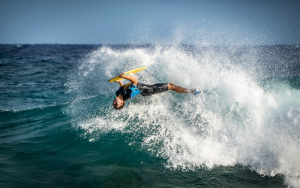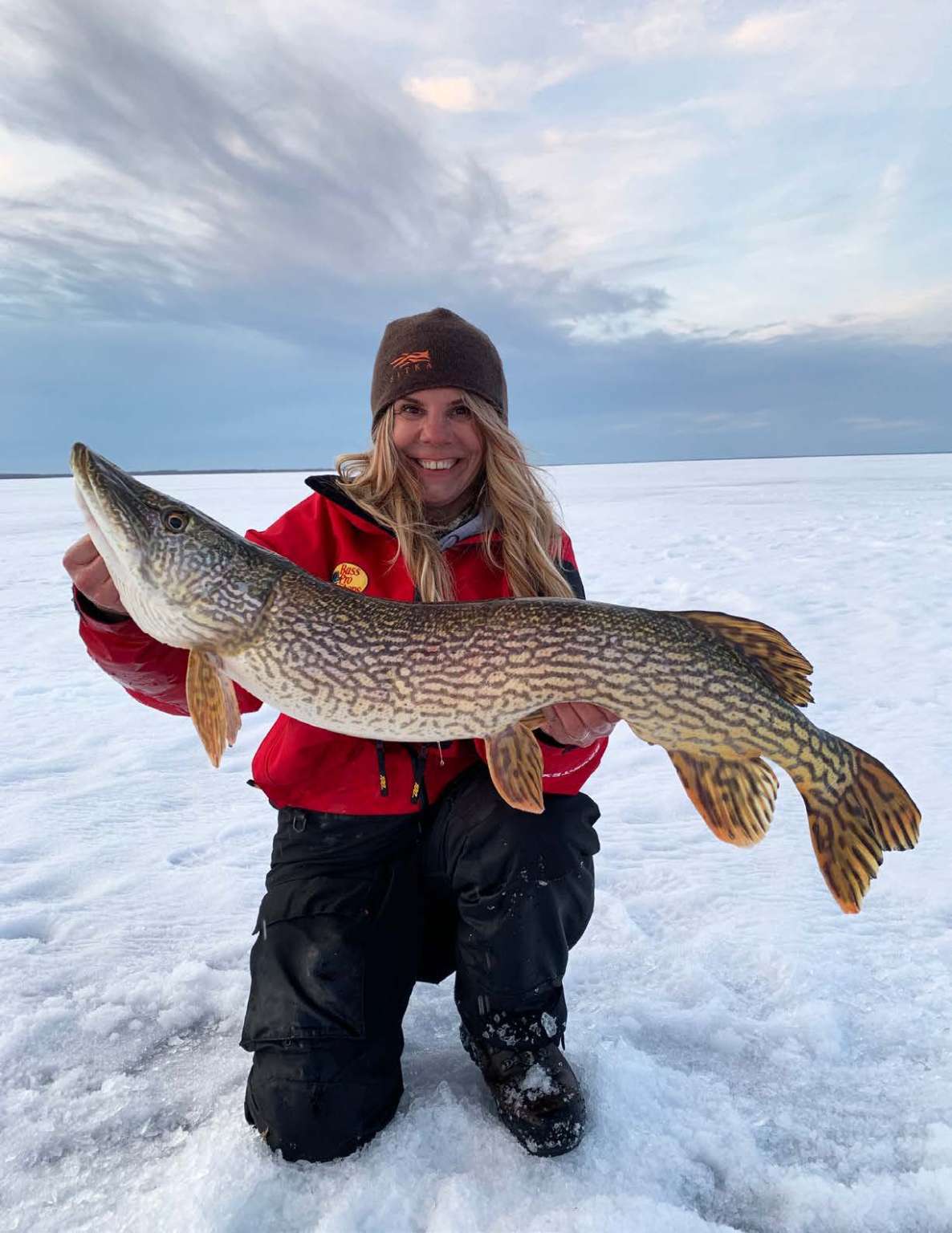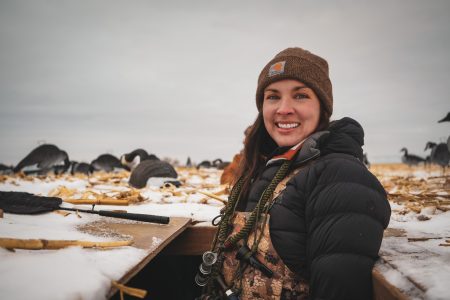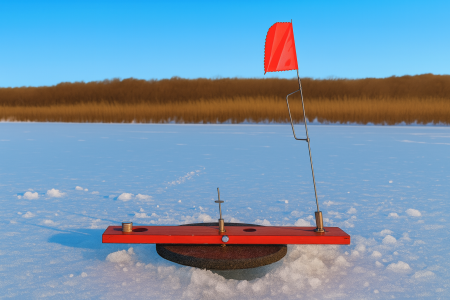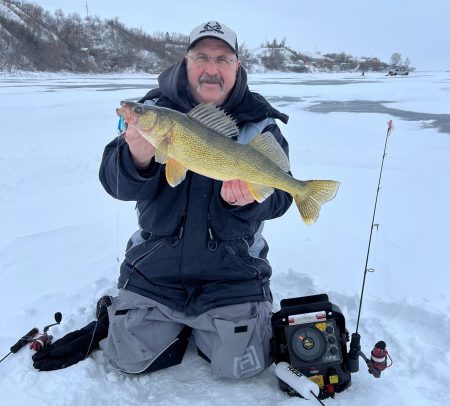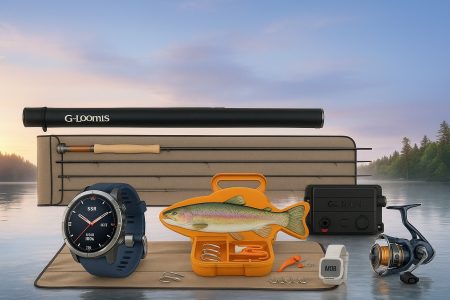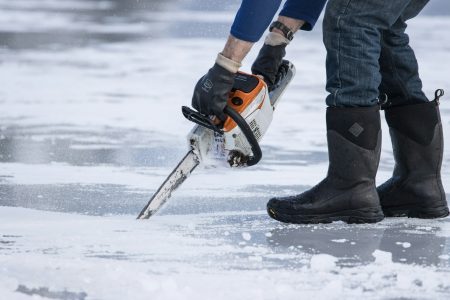That’s When the World Goes Quiet
Ice fishing on Tobin Lake means big skies, beautiful pike, and cold hands. When there’s a trophy fish on the line, time stands still.
I spend countless days sitting on frozen lakes staring down an augured hole targeting multi-species on Alberta lakes. I drop a line in the depths of the ice-cold water and target fish for different reasons, but when the bait takes a hit, and the line goes tight, something inside me changes. My outside world fades. I am alive and overwhelmed with hope and gratefulness.
When the opportunity came for my first ice-fishing trip away from my home province, I was up before the sun and headed east to Tobin Lake with the anticipation of hooking into a substantial northern pike.
Tobin Lake is located in the east-central part of Saskatchewan. At 269 square kilometers, it covers an area twice the size of the province’s largest city, Saskatoon, which is surrounded by boreal forest and is known for consistently producing monster pike and walleye. The lake is home to a world record walleye caught through the ice. Father Mariusz landed this trophy walleye while ice fishing. It weighed in at 18.3 pounds. With the lake being a healthy fishery, landing a pike of over 30 pounds is a possibility, and I was looking for the opportunity to try.
Over the entire nine-hour drive, I imagined setting the hook in a big aggressive northern pike. With solid and robust bodies, they are vicious and voracious predators. Pike have been called “water wolves.” They are visual hunters, always on the prowl for their next meal. Their sheer size, strength, and fighting ability are why I target northern pike.
Spectacular Place
The first two days on Tobin Lake were spectacular: Plus three degrees Celsius, a slight breeze, and a vibrant blue sky that went on forever. I caught and released plenty of perfectly adequate pike, but I was still hoping to land a big northern Saskatchewan specimen. However, a watched fish never bites, so I decided to take a break from fishing, make fried hash browns with moose meat and bacon, and take in what was going on above the lake.
As the sun set, the vivid colors lit up the entire sky, proving Saskatchewan’s reputation as the “Land of the Living Skies.”
The final morning as I headed out, it had dropped to minus one degree C. The wind ripped across the lake at 50 to 60 kilometers an hour. I drilled a few holes with my E6 Jiffy auger on one of the sandbars that dropped off into deeper water. With my tip-ups released down the hole, I was ready to land some giants on one of Saskatchewan’s premier lakes.
Cool, Cloudy, Quiet
Throughout the first hour, it was quiet under the ice. The sun was trying to peek through the cloud cover, but the strong gusts of wind pulled curtains on the rays. I cleaned the holes, checked the bait, and waited. The high winds occasionally triggered false flags, and each time hope briefly pulsed in my chest before dissipating.
Just as I walked back to the truck to warm up for a bit, I turned around to see the first actual flag up. Sprinting over to the hole, I knelt down and could see the tip-up spool spinning quickly; the fish was on a decisive run. She was strong, full of energy, and was taking plenty of line. This fish wasn’t coming in without a fight.
Setting the hook. |
|
Timing is everything. I carefully laid the line in my hands and waited until she was done running. With a right, then left pull, I set the hook. Then, it was as if the world went quiet and stopped. I didn’t hear a sound above the ice. All I heard was silence.
My Dacron line had a single J hook baited with a 10-inch frozen herring suspended just off the bottom. A pike’s mouth has hundreds of sharp teeth, allowing them to clamp down on their prey and drag it through the water to drown it. I felt my pike’s determination and strength as the line pulled through my fingers. My body began to shake; I looked down the augured hole to see her massive, elongated, dark-green-spotted body swim past. Gently retrieving more line, I directed her to the hole’s opening. Adrenaline raced through my body as her massive head crested the top of the hole. I slid my fingers up her gill plate, bringing her out of the hole and fully supporting her body with my other hand. All the noise of the outside world came racing back as I took in her stature.
Into the Well
To protect my pike from the winds and keep her eyes and body wet, I immediately put her in the open-ended live well. This consists of six holes drilled side by side, about 10 inches through the ice, with a seventh drilled all the way through. This non-contained holding well fills with water, allowing the pike to rest and recover while the hook is removed.
My fingers were numb, and the wind was biting hard. As I placed my hands back in the ice-cold water, the pain and burning quickly took my hard-earned smile away. Keeping the pike submerged to ensure her eyes didn’t freeze, my sleeves were wet while removing the hook. The pike was resting quietly in the live well, but pain gripped my frozen hands. The Saskatchewan wind let me know that it was serious, and I urgently needed to change my wet hoodie and get some feeling back in my hands.
After a few minutes, my bright red hands were ready to go back into the bitterly cold water, and I ran my fingers along the pike’s massive gill plate. In one swift motion, I used my other hand to support her magnificent body for a quick picture. I put the pike back in the live well gently, and with a strong flip of her tail, she let me know she was ready to be released.
There is nothing quite like the excitement of catching trophy pike, especially when bringing them through the ice. It’s a true challenge to time the setting of the hook, to know when to let those big pike run, and when to start retrieving the line. This tug of war continues under and above the ice. Fail to keep the line away from the ice walls so it doesn’t get cut, and you lose the fish.
With my hard-won battle captured on camera, I could head back home happy in the knowledge that my Tobin Lake ice fishing trip had lived up to my every expectation. When lengthening days and warming temperatures materialize into spring, I look forward to returning to Saskatchewan and another battle with one of the trophy pikes that dwells there.
